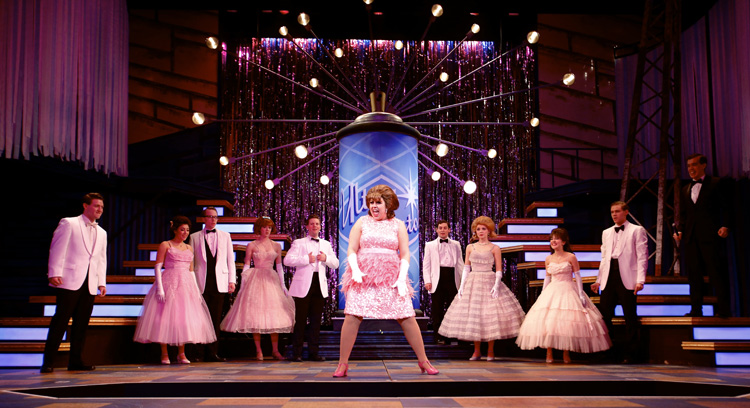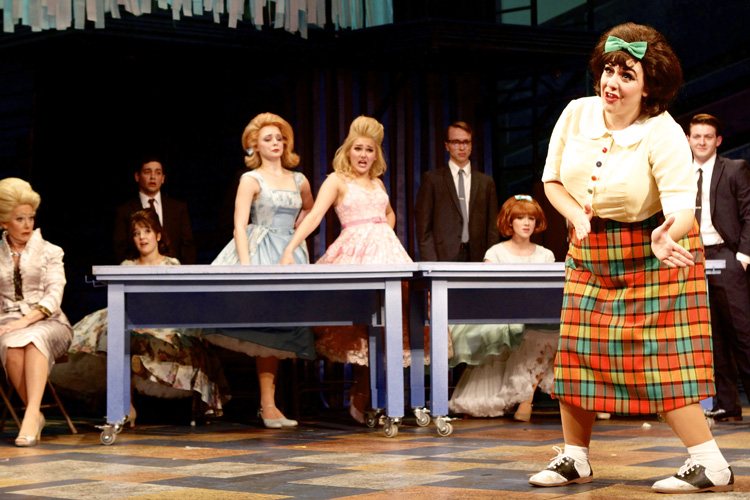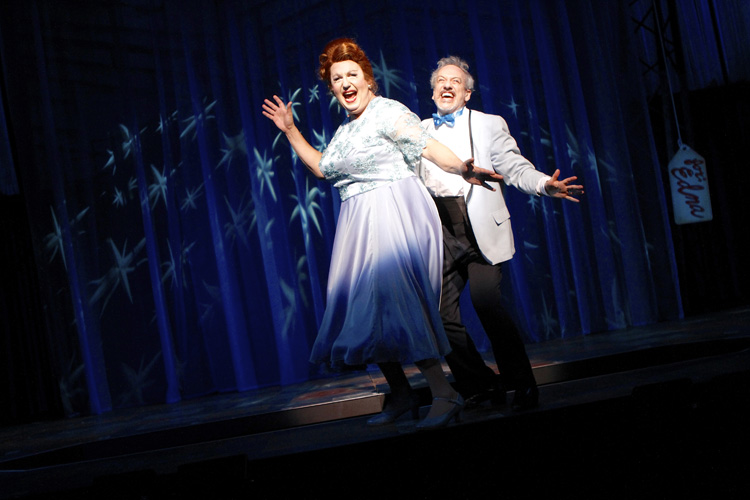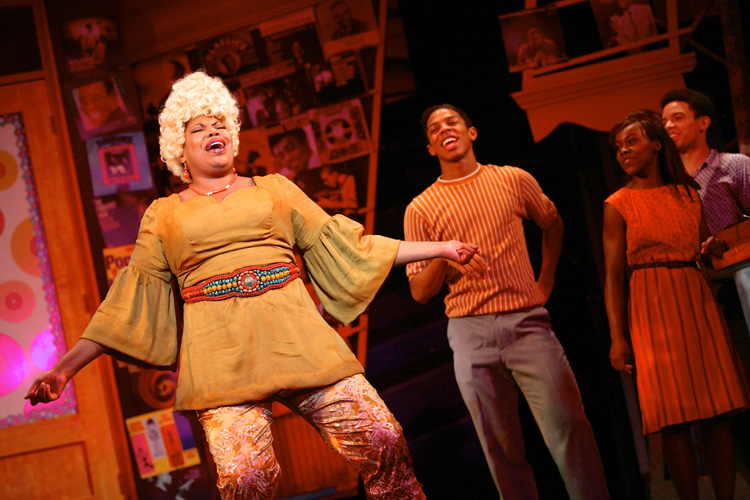Filmmaker and satirist John Waters, the Baltimore bad boy, might be housebroken now, but he is never to be taken for granted. From two film versions of Waters‘ Hairspray, non-singing (1988) and singing (2007), as well as several previous local productions, most audiences are onto Hairspray’s thesis of racial integration, as well as many of its delirious comic devices.
That means for the annual collaborative holiday show from Syracuse Stage and the Syracuse University Drama Department, which offers the biggest box office of the year, production values had to trump the charm of what has become a familiar item. To do that, the companies have called up the A-team of stage director Bill Fennelly, ace resident choreographer David Wanstreet and music director Brian Cimmet (White Christmas, 2012), in charge of the Marc Shaiman-Scott Wittman period score.
With extensive national credits, the still-boyish Fennelly has made only one appearance here before: the knock-your-eyes-out A Midsummer Night’s Dream in March 2013, which copped Syracuse New Times Syracuse Area Live Theater (SALT) Awards for both production and director. It was also a preview of what audiences get this time.

Michael Davis Photo | Syracuse New Times
Instead of slavishly mimicking the Waters films, Fennelly remakes the show with perhaps a hundred examples of verbal wit, more than an audience can comprehend. He has scenic designer Adam Koch borrow motifs from Baltimore’s distinctive (and hideous) Formstone siding. Many of Erin Kennedy Lundsford’s wigs look to come from Salvadore Dali land, but when they get to harridan TV producer Velma Van Hassell (Marie Kemp), they’re right on target. Yes, that pompadour evokes right-wing dragon Phyllis Schlafly.
Not that Fennelly ever betrays Waters’ intentions or tone. Plus-sized Tracy Turnblad (Mary DiGangi) is still an ebullient ball of starry aspiration, just a little trimmer and cuter. Her high-energy opening number, “Good Morning Baltimore,” with Wanstreet’s precise but never mechanical dance steps, sets a high bar that she continues to meet and eventually exceeds.

Michael Davis Photo | Syracuse New Times
A fighter but still a dutiful daughter, Tracy has warm relations with her stay-at-home mom Edna (David Lowenstein). The casting of Lowenstein, a Broadway veteran who is also a part-time faculty member, is Fennelly’s signal declaration of independence. John Waters’ lust for absurdity led him to cast his massive cross-dressing pal Divine as Edna, a guy who never looked like a woman. This led to other huge guys in the role, including Harvey Fierstein and John Travolta.
Lowenstein wears an oversize housedress in opening scenes and speaks in a baritone, to great comic effect: “If you want to be famous, learn how to get blood out of car upholstery.” But Lowenstein sings superbly and when gussied up makes a rather fetching middle-aged matron. This gets laughs where they did not exist before.

Michael Davis Photo | Syracuse New Times
The title “hairspray” spoofs the now half-century-old fashion that women had of inflating the size of their hairdos, both unhealthy and unecological, and now laughably antique. In Waters’ portrayal, a gone style is equated with once dominant (if not discarded) attitudes toward race. Getting black kids to appear next to white ones on TV dance shows in a Class-D market hardly has the import of parallel struggles also occurring in 1962, like gaining entrance to Southern universities and public accommodations. Those battles don’t lend themselves to musical comedy. Instead, the show takes on the issue in miniature by recognizing the African-American art form of rock’n’roll. The intentions are no less serious.

There are bound to be people who feel Hairspray, with its political, if gentle, edge, is not a family show in the same sense that A Christmas Carol, The Sound of Music or Jean Shepherd’s A Christmas Story are, but it is still a celebration of family values. Not only is Tracy a loyal member of her supportive family, but her parents Edna and the diminutive Wilbur (Mark David Kaplan) seem genuinely in love. Their amorous duet, the vaudeville-like “Timeless to Me,” one of the few non-production musical numbers, stops the show. It’s not the only number to do so.
In his quest for quality, Fennelly has imported only five Equity players for the 29-person cast, including Mary DiGangi as Tracy and the splendid Aurelia Williams as Motormouth Maybelle, the powerhouse record store owner in the Negro district, who wows with the first act’s finale, “Big Blonde and Beautiful.” Elsewhere, students fill a generous number of roles with lengthy moments in the spotlight.

Michael Davis Photo | Syracuse New Times
Yet the scene-stealers are the Equity card faculty members: Lowenstein, of course, as well as Leslie Noble and Marie Kemp. The dainty Ms. Noble appears in four roles, only one of which, the repressed mother Prudy, draws on her body set. Instead, she has much more fun as the outrageously butch jail guard.
Soprano Marie Kemp has been a director (this fall’s SU Drama show Parade) as well as a performer with many companies, usually in ladylike roles, such as Anna Leonowens in The King and I. Driven, obsessive and lusty, her Velma could well be the most indelible takeaway from the show, especially for anyone who remembers earlier incarnations. Kemp, who once had a one-woman cabaret of lyrical show tunes, might think of adding “Miss Baltimore Crabs” to the roster, just to show there’s a naughty creature inside all that elegance.
Tristen Buettel scores high as snotty, racist Amber, who is indeed the tops of the beautiful white girls. Austin Holmes’ dizzying dance steps as Seaweed, Maybelle’s son, shows the suburban kids how to do it and wins the heart of Penny (Lila Coogan); interracial romance turns her from a duckling to a swan. Troy Hussmann’s good-guy crooner Link is period-perfect. And recent graduate Kyle Anderson puts the right gleam on dance show host Corny Collins, who might be ultra-smarmy but is nobody’s fool.
CLICK HERE to go behind the scenes of Syracuse Stage’s Hairspray
Hairspray continues through Jan. 4. Call 443-3275 for information. TICKETS can be purchased online at syracusestage.org



